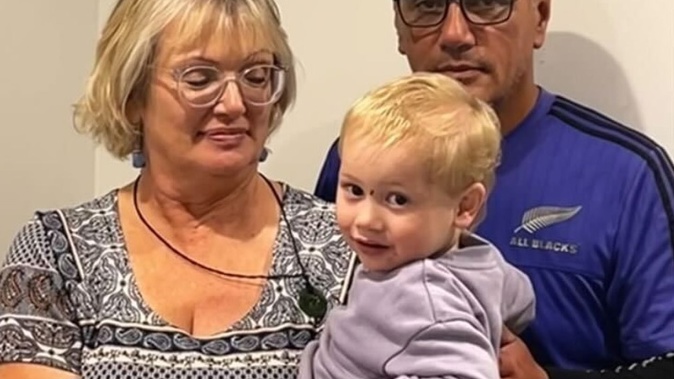

WARNING: This article contains graphic images.
When Colin Rangitaawa went to work and stepped in a puddle, he could not have foreseen the serious consequences one simple action would have.
The liquid he thought was water was actually caustic soda and within hours black blisters covered his feet as the corrosive liquid began to eat away at layers of skin and flesh.
Rangitaawa was working at Alto Packaging Limited, a rigid plastic manufacturing company with a history of breaching workplace safety standards, at the time of the December 2021 incident.
Unbeknown to him the substance, also known as sodium hydroxide and commonly used as a heavy-duty cleaner, had leaked onto the floor of the Lower Hutt workplace.
Now, almost 18 months on, he has lost the tips of two of his toes and his recovery continues.
“What I thought was going to be my future, has changed,” Rangitaawa told Hutt Valley District Court this week through a victim impact statement read by his wife, Daphne.
“This should not have happened [...] I don’t want this to happen to anyone else.”
/cloudfront-ap-southeast-2.images.arcpublishing.com/nzme/PNNAJNMHWNGFPDRVGHKOON6IGE.png)
Caustic soda is pictured in the area where the leak occurred. Photo / WorkSafe
In failing to issue its employees correct personal protective equipment (PPE) and appropriate training and information when working around caustic soda, Alto Packaging breached the Health and Safety at Work Act 2015.
After its investigation, WorkSafe charged the company with breaching three sections of the Act by exposing workers to a risk of serious injury or death.
Alto Packaging pleaded guilty and Judge Arthur Tompkins convicted and fined the company $242,000 and ordered it to pay Rangitaawa an additional $50,000 in emotional harm reparation.
Speaking to the Weekend Herald following the sentencing, the 62-year-old Wellington man said the money wasn’t a patch on what he and his whānau endured in the aftermath of the workplace incident.
“I had no idea what was involved in getting better [...] it took more of a toll on me than I thought,” he said.
“This will be with me for the rest of my life.”
But Rangitaawa, who said he’d asked for a pair of gumboots but was told no because he was only a “temp”, said his injuries “could have been much worse”.
In the early hours of December 16, 2021, a night shift supervisor noticed a container that fed caustic soda, a cleaning agent, into a vat was empty and a step nearby was wet.
A hose that helped the flow of the toxic material was split, causing fluid to leak onto the ground.
The system was fixed and a safety chain was put in place to block off the area which was hosed down to dilute the liquid.
The supervisor also told the team to keep away from it because, according to the summary of facts, “he was not 100 per cent sure it was safe”.
/cloudfront-ap-southeast-2.images.arcpublishing.com/nzme/JPOKNGQP2JCZFOPZSXJS6EB6GE.jpg)
Rangitaawa has lost the tips to his little toes. Photo / Supplied
But when the morning staff started their shift, a “communication breakdown” meant Rangitaawa, who worked as a labour-hire on placement from a recruitment agency, was unaware of the potential risk.
He had only been working at the site for 10 weeks when the incident occurred.
On his feet that day were steel-capped “safety shoes” brought from home that Rangitaawa said looked like sneakers.
There was no safety chain in place when he began his shift and he entered the affected area at 7.30am.
It took minutes for Rangitaawa to complete his task and shortly after he began to feel discomfort in one of his toes.
Assuming it was gout, a condition he suffered from, he went home to take medication as the ache worsened. He returned to work but at that stage, both of his feet were causing him agony.
Rangitaawa went home again and removed his shoes.
Black blisters covered his feet and when he went to the hospital, an Emergency Department nurse immediately recognised his injuries.
“She just leaned over [the counter] and said to me straight away ‘that’s chemical burns’,” he recalled.
The wounds were washed and tested and returned readings on the highest end of the pH scale, which measures acidity in water.
Rangitaawa did not understand the severity of the burns until he was told he might lose his toes and would need to learn to walk again.
“I thought ‘Oh, I’m not going home today’.”
While Rangitaawa had spent just three-and-a-half minutes in the area of the spill, he spent more than a week in hospital where he underwent invasive skin grafts and scraping.
He was released on Christmas Eve.
Christmas Day was a struggle with little things like not being able to pick up his grandson Zakai for fear of falling over.
“When he goes to bed at 7.30pm everybody gets a hug,” Rangitaawa said. “I couldn’t pick him up and he noticed that.”
Following the incident, the once active grandfather was confined to the couch and visited by an ACC-funded nurse multiple times a week.
/cloudfront-ap-southeast-2.images.arcpublishing.com/nzme/OADIWG2SNVCY3IA6ZJ5BHVEVP4.png)
A makeshift wooden pallet walkway was installed after the incident. Photo / WorkSafe
He had to take extreme care not to knock the skin grafts, and was unable to sleep in his bed for almost a month as he could not climb the stairs to reach his bedroom.
Rangitaawa lost the tips of both of his little toes and his balance was impacted.
He felt his recovery put pressure on his whānau who had to take leave from their jobs to assist him with daily tasks such as showering and using the bathroom.
When he returned to work six months later, Rangitaawa was the target of“ill-informed, negative comments” from his co-workers, Judge Tompkins said.
Not the first prosecution
At the sentencing, WorkSafe prosecutor Tanya Braden told the court Alto Packaging, a division of Pact Group, had previously been prosecuted in two unrelated cases.
In 2020 a worker became stuck in a machine at an Auckland site and died from his injuries.
Three years earlier in 2017 a worker lost two fingertips in a food packaging machine.
On behalf of the company, lawyer Daniel Erickson told the court the safety practices observed on the day of the chemical burn incident were not in line with what Alto Packaging expected, but it accepted responsibility for the incident.
“Alto is genuinely remorseful for what has occurred,” Erickson said.
He said the site had experienced difficulties in hiring a health and safety manager and there were vacancies for senior roles.
The court heard Alto Packaging had a high turnover of temporary staff and the company had not provided Rangitaawa and other employees with appropriate PPE and adequate training.
Pact Group executive general manager Eric Kjestrup said the company accepted the court’s decision and had since made safety changes to its work sites “to ensure this sort of accident does not happen again”.
“The incident and resulting injury to an employee at our Alto Packaging facility in Wellington in December 2021 is regrettable and should not have occurred,” he said in a statement.
“Safety is and always should be the number one priority for Pact and its entities and we are sorry that this employee was injured at one of our sites.”
Time to move on
Rangitaawa said the memory of a family member who had died since the incident has inspired him in his recovery.
“When I got down and out he picked me up,” he said. “He inspires me to get better. I want to get better not just for me but for him.”
Rangitaawa no longer worked for Alto and said he was now doing work he enjoyed as a gateman at a high school in the Wellington region.
Though his feet still swell on occasion and he now walked with a limp, Rangitaawa said it was time to let go and move on.
“You can’t dwell on things for too long or it will drag you down,” he said.
“I’m not angry at anyone any more. You can’t blame anyone for what happened. [But] I’ll always remember, I’ll always keep the photos.”

Take your Radio, Podcasts and Music with you









